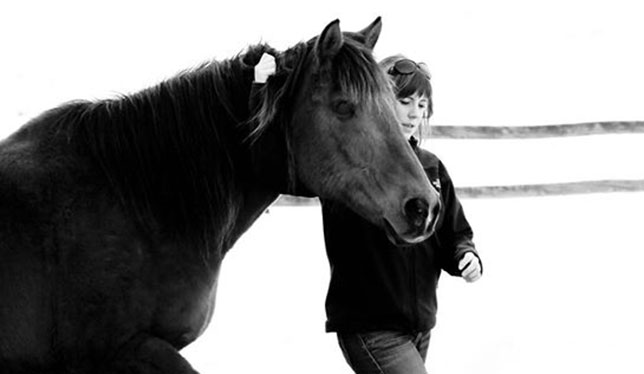
She might begin the day by attending a euthanasia, assisting a family to say goodbye to a beloved pet, before moving on to counsel a stressed-out veterinary student. After a quick bite to eat, she might then throw on a pair of rubber boots and head out on a farm call with a vet who’s worried about the emotional toll a livestock crisis is having on a client. “For me, never knowing what my day will look like is perfect,” says Erin Wasson, the first social worker to be employed by the University of Saskatchewan’s Western College of Veterinary Medicine. “I’m always excited about what the next day will bring.”
Ms. Wasson began working at the veterinary college on a practicum in September 2014 while completing her master of social work degree. She was offered a full-time position the following summer through the new veterinary social work program, a groundbreaking initiative that sees her providing support to students, staff and faculty as well as to their clients.
The program, reportedly the first of its kind in Canada, is a partnership between the veterinary college and the University of Regina’s faculty of social work. The deans of the two faculties launched a joint committee in the fall of 2013 to develop the program. The demands on veterinary students are high, which leaves some feeling burnt out and depressed. Their stress is compounded by the emotional pressure of dealing with sick animals and devastated owners. The deans felt that an on-site social worker would be a much needed safety net.
Ms. Wasson grew up in a farming community and owns both horses and small animals. Her deep understanding of the intensity of human-animal bonds, paired with her social work skills, made an immediate impression on Darlene Chalmers, an assistant professor with the faculty of social work and co-chair of the joint committee. She and co-chair Trisha Dowling, a professor of veterinary clinical pharmacology at the veterinary college, moved quickly to get Ms. Wasson embedded at the veterinary college.
“It has been an amazing journey,” says Dr. Dowling. “On a daily basis someone says, ‘What did we do before Erin?’ She can jump into a situation where most of us would just stand stunned.” Dr. Dowling says she’s buoyed by the knowledge that each year the college will graduate 80 veterinarians who have interacted with a social worker. “The implications are huge. As they spread out across Western Canada, they’ll be better equipped to take care of both themselves and their clients. It’s a massive win-win.”
For her part, Ms. Wasson is already looking at ways to expand the program. In January, she began supervising an MSW student who will spend a year doing research on student stress. Other initiatives on her agenda include a focus on veterinary wellness (she is working with Dr. Dowling to design a series of retreats) and increased collaboration with student services to further equip faculty and students to manage issues related to mental health and substance abuse. “I am very blessed,” says Ms. Wasson, “to be part of an institution that’s so focused on creating a positive culture.”